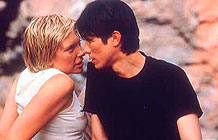|
|
|
|
Japanese
Story
|
 |
|
Japanese Story starts in familiar territory. An uptight Japanese businessman, Hiromitsu (Gotaro Tsunashima), drives through the stark, Australian landscape. He is disconnected from his surroundings, absorbed in the usual rituals of materialist alienation such as listening to his car radio. A polaroid of himself in this strange, foreign country is really all he craves. Enter Sandy (Toni Collette), a geologist who reluctantly has to meet and chaperone Hiromitsu through the Pilbara region. Their cultural differences and misunderstandings create moments of tension as well as humour. Gradually, these barriers begin to break down – especially during a long scene in which they deal with their vehicle stuck in the dirt – and the possibility of intimacy looms. If that was the sum total of Japanese Story, I would regard as a fairly ordinary, flawed, sometimes clunky film. The clash of cultures out in the Oz landscape has been handled with more verve by Clara Law in The Goddess of 1967 (2000). And many comedies, the world over, have provided more up-to-date bulletins on modern manners in multicultural societies. But Japanese Story – couldn't someone involved have devised a better title than that? – has bigger things on its mind. None of these issues are really flagged for us in the early part of the story, except in the testy interaction between Sandy and her Mum (Lynette Curran), who fastidiously maintains a scrapbook concerning everyone she has ever known or met. The film depends on a dramatic, unexpected, mid-way plot development that it would be churlish to spoil here. But this makes reviewing the film properly an impossible task, especially since everything that is best in the movie congregates in its second half. Suffice to say, the mood of this second part of the film is distinctly more sombre than the first. And Brooks' style modulates accordingly, relying more on images, silences, and emotional suggestion, recalling for me the work of Claire Denis (Beau travail, 1999) – not a comparison I have been moved to make by any other commercially released Australian film of the past decade. What is remarkable about the film's plot twist, beyond its content, is the bold rupture of tone it introduces into the unfolding shape and structure of the work. It is almost as if we are presented with two radically different movies, and then asked to make sense of their uneasy but tantalising join. Here Brooks and writer Alison Tilson show their debt to a rich tradition of independent (sometimes underground) filmmaking in Australia. Their willingness to experiment at this level – and their faith in a sophisticated audience that will take on this challenge to convention – is the most refreshing thing about Japanese Story. The greatest achievement of the film is in the way it bravely builds to a long, final passage of unbroken intensity. Elizabeth Drake's lilting, orientalised score, which grates during an earlier sex scene, here comes into its own and helps carry the story to its wise conclusion. Anyone's opinion of Japanese Story is going to depend, in large part, on their estimation of Collette's performance. For me, there are a few jarring, histrionic moments where she is too obviously displaying the tricks and mannerisms of her craft, Kevin Spacey-style. But there is no doubting that, once we reach the heart of the film, Collette shines, taking us to a place of emotional revelation that few Australian films ever dare approach. MORE Brooks: Road to Nhill © Adrian Martin September 2003 |
![]()